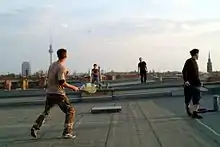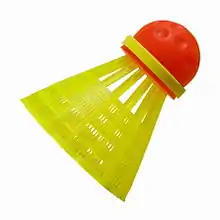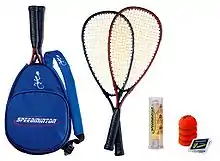Crossminton
Crossminton (previously known as Speed Badminton) is a racket game that combines elements from different sports like badminton, squash and tennis. It is played without any net and has no prescribed playground, so it can be executed on tennis courts, streets, beaches, fields or gyms.
 Logo of ICO | |
| Abbreviation | ICO |
|---|---|
| Founded | 25 August 2011 |
| Type | Federation of national associations |
| Legal status | Governing body of crossminton |
| Purpose | Sport governance |
| Headquarters | Berlin, Germany |
Region served | Worldwide |
Membership | 31 national associations[1] |
Official languages | English |
President | Matjaž Šušteršič |
Financial officer | Yoko Koizumi |
Board of Executives | Maximilian Franke Petr Marklik Daniel Robles Rodríguez Charly Knobling[2] |
Secretary General | René Lewicki |
Main organ | General Assembly |
| Website | www |

The sport is often associated with the brand Speedminton because of their historical relation. From 1 January 2016 the name of the racket sport has been changed from Speed Badminton to Crossminton. Today, Crossminton is played all around the world. Currently, there are tournaments all over the world which are organized in a growing number of clubs. On August 25, 2011 the International Crossminton Organization (ICO) was founded under the name International Speed Badminton Organisation (ISBO) in Berlin. By 2018 the ICO already had 26 members - national federations from Europe, America, Asia and Africa.
History
The special shuttlecock and the idea of the game were invented in 2001 in Berlin by Bill Brandes.[3] The game was refined to the final game of crossminton by the Speedminton company. The inventor first named his new sport "shuttleball", but soon the game was renamed "speed badminton". Starting from January 2016 the name was changed again, to crossminton. Originally, the idea of the inventor was to create an outdoor variant of badminton, so he changed the ball to be smaller and heavier (today called speeder). The analogy of badminton now exists only in a technical way: there is no net and the game tempo is faster. In 2003, there were already 6,000 active players in Germany. The sport is growing steadily and there are numerous international tournaments across Europe.
Game
Court
The court consists of two squares of 5.50 m (18 ft) length. They are fixed opposite to each other at a distance of 12.8 m (42 ft).
Equipment

Both of the players need a racket.[4] The rackets are similar to the ones used in squash but are specially produced for Crossminton. They are 58–60 cm long, and the material and the strings are different. The ball is called a speeder and is heavier than a conventional badminton shuttlecock, meaning it can be used up to wind force 4.
| Speeder-Type | Flight distance | Speed |
|---|---|---|
| Fun Speeder | 13–18 m | 260 km/h |
| Match Speeder | 17–25 m | 290 km/h |
Rules

The field consists of two squares measuring 5.5 meters (18 ft) on each side. The distance between the squares is 12.8 meters (42 ft). Crossminton can be played on half of a tennis court which can easily be modified with elastic lines. Match Speeders are used for normal games. Children and adolescents (U12) play with fun speeders on a smaller court (4x4 m) over a smaller distance (9 meters).[5]
The aim of the game is to reach the square of the opposite player with the speeder. If the speeder falls outside the opposite square, the other side gains a point. Both players are allowed to step out of, or anywhere inside their square during play.
The game ends when one player has at least 16 points and has at least 2 points advantage over their opponent. Every time a set/round finishes, the players switch sides.
Match
A game ends when one player reaches 16 points. If the score is tied at 15 or greater, play continues until one player has a two-point advantage. A match usually consists of two winning sets (best of three).
Service
The right to serve first is drawn by throwing a coin or a speeder. Every player has three serves. Every rally scores. At a score of 15:15 the serve switches after every point. The serve must be done out of the designated zone which is 3 m behind the front offensive line. This line must not be crossed and the serve is played bottom-up. The first serve of the next set is done by the loser of the previous set.
Points
Every rally scores if there is no necessity to repeat it. Points can be gained if:
- the serve is not correct
- the speeder touches the floor or the roof
- the speeder lands in the opposite court and cannot be returned
- the speeder lands outside the court (the lines count as being within the court)
- the speeder is touched two times immediately after each other
- the speeder touches the body
If a player returns a speeder from outside the court, it is considered to still be in play.
Change of ends
After every set, there is a change of ends to guarantee equal opportunities concerning wind and lighting conditions. If a fifth game (tiebreak) becomes necessary, players change sides after every 6 points.
Variants
- Doubles : The doubles match is played on a single court.
At the double division, both players are standing in the same court. The coin or speeder decides the side who serves first. The serving player stands at the backline, and his partner stands in front. The serves rotate between the four players. The first serve in the following set goes to the loser of the previous one.
- Black lighting : Crossminton can be played by night with fluorescent equipment and black light.
Crossminton can be played outside and inside, the court can be painted or pegged off. There is even the possibility to use a portable court. Crossminton played in the dark is called Blackminton. With black lights, fluorescent paints, rackets and special speeders (night speeders) with glow sticks (speedlights) it is possible to play even at night.
World & European Championships
The first Crossminton (former Speed Badminton) World Championships took place on 26 and 27 August 2011. It was officially named ‘ISBO Azimut Hotels Speedminton® World Championships’. Over 380 participants from 29 countries played in Berlin, in 10 categories. Players from Canada, the US and Australia also attended. Per Hjalmarson from Sweden won the men’s title, Janet Köhler from Germany won the women’s title and Rene Lewicki & Daniel Gossen from Germany won the doubles title in the final games. Since then the World and European Championships alternate every year.
| Year | Tournament | City | Open Division | Female Open | Open Doubles | Female Doubles | Mixed Doubles | U18 Male | U18 Female | |||||||
|---|---|---|---|---|---|---|---|---|---|---|---|---|---|---|---|---|
| Champion | Runner-up | Champion | Runner-up | Champion | Runner-up | Champion | Runner-up | Champion | Runner-up | Champion | Runner-up | Champion | Runner-up | |||
| 2011 | 1. ISBO Azimut Hotels Speedminton® World Championships | not played | not played | |||||||||||||
| 2012 | 3. ISBO European Championships | |||||||||||||||
| 2013 | 2. ISBO Speedminton® World Championships | |||||||||||||||
| 2014 | 4. ISBO European Championships | |||||||||||||||
| 2015 | 3. ISBO Speedminton® World Championships | |||||||||||||||
| 2016 | 5. ICO European Championships | |||||||||||||||
| 2017 | 4. ICO Speedminton® World Championships | |||||||||||||||
| 2018 | 6. ICO Speedminton European Championships 2018 | |||||||||||||||
| 2019 | 5. ICO Crossminton World Championships 2019 | |||||||||||||||
International tournaments
There are many international crossminton tournaments taking place all around the world under the supervision of the International Crossminton Organization.[6] Every member country can host up to one 1000/500 points tournament and four 250 points tournaments every year. There are only five 1000 points tournaments every year, chosen by the ICO based on the applications sent by member federations. The series of 1000 and 500 points tournaments is called World Series.
By participating in international ICO tournaments the players receive ranking points based on their results.[7] Ranking points are used to determine seeding for upcoming tournaments.
| Date | Tournament | City | Open Division | Female Open | Open Doubles | |||
|---|---|---|---|---|---|---|---|---|
| Champion | Runner-up | Champion | Runner-up | Champion | Runner-up | |||
| 17.-18.3.2018 | 10. ICO Speedminton® Slovenian Open | |||||||
| 28.-29.4.2018 | 10. ICO Speedminton® Hungarian Open | |||||||
| 5.-6.5.2018 | 11. ICO Speedminton® Croatian Open | |||||||
| 19.-20.5.2018 | 9. ICO Speedminton® SLOVAK Open | |||||||
| 1.-2.6.2018 | ICO Speedminton® Japan Open | |||||||
| 22.-23.6.2018 | ICO Speedminton® Polish Open | |||||||
| 21.7.2018 | 2018 ICO Speedminton® Swedish Open | |||||||
| 8.-9.9.2018 | 2018 ICO Speedminton® Serbian Open | (future event) | ||||||
| 29.-30.9.2018 | 8. ICO Speedminton® Czech Open 2018 | (future event) | ||||||
| 19.-21.10.2018 | 2018 ICO Speedminton® German Open | (future event) | ||||||
| 9.-10.11.2018 | 2018 ICO Speedminton® Latvian Open | (future event) | ||||||
| 17.-18.11.2018 | 2018 ICO Speedminton® Spanish Open | (future event) | ||||||
* 1000 points tournaments are denoted in bold characters
Nations Cup
Since 2013 the ICO has organized a national team competition called ICO Nations Cup.[8] The concept is derived from tennis competitions like David Cup or Fed Cup, but in crossminton mixed teams consisting of both male and female players are competing. First, Regional tournaments are played in group- or elimination system and then the winners of Regional tournaments – Regional Champions – battle it out for the title of ICO Nations Cup Champion at the Final tournament.[9]
A national team consists of at least three players – 2 male players (open category, but not as a rule) and 1 female player (women’s category, but not as a rule) – and not more than five players (3 players + 2 reserves that can step in for either singles or doubles matches). A clash between two national teams consists of 6 matches – 4 singles and 2 doubles matches.
| Year | Final Tournament Venue | Champion | Runner-up |
|---|---|---|---|
| 2013 | |||
| 2014 | |||
| 2015 | |||
| 2016 | |||
| 2017 | |||
| 2018 | |||
| 2019 | |||
| 2020 | (future event) | (future event) | |
References
- crossminton.org. "Members - International Crossminton Organisation". Retrieved 29 April 2018.
- crossminton.org. "Executives - International Crossminton Organisation". Retrieved 8 August 2018.
- "Speed Badminton - ein Sport, den es ohne Berliner nicht gäbe - Berlin-Sport - Berliner Morgenpost"
- "Equipment". International Crossminton Organisation. Retrieved 2018-08-08.
- "The Rules". International Crossminton Organisation. Retrieved 2018-08-08.
- "Tournament calendar". International Crossminton Organisation. Retrieved 2018-08-08.
- "World Rankings". International Crossminton Organisation. Retrieved 2018-08-08.
- "Past results". International Crossminton Organisation. Retrieved 2018-08-08.
- "Tournament mode". International Crossminton Organisation. Retrieved 2018-08-08.
- "Past results". International Crossminton Organisation. Archived from the original on 2020-06-18. Retrieved 2020-06-18.
External links
| Wikimedia Commons has media related to Speed Badminton. |
- Crossminton - International Site about the new racket sport.
- Speedminton - Site of the producer Speedminton with videos, photos and all information about the new sport.
- ISBO / ICO– Site of the International Crossminton Organisation
- Speedminton Gekkos Berlin e.V. - Site of the first official Speed Badminton/Crossminton club in Berlin; with photos and advice. (in German)
- SbK Lipany - Speed Badminton Club Lipany. (in Slovak)
- Speed Badminton in Canada - Site of the first official Speed Badminton club in Canada.
- Speedminton Blackminton PORTUGAL - Portuguese site with photos, videos, events, online store and much information.
- German Speed Badminton Association / German Speed Badminton Association - The German Crossminton Association (in German)
- SC "Crossminton Bulgaria" - site of the first crossminton club in Bulgaria]
- Česká asociace crossmintonu - official site of the Czech Association of Crossminton. (in Czech)